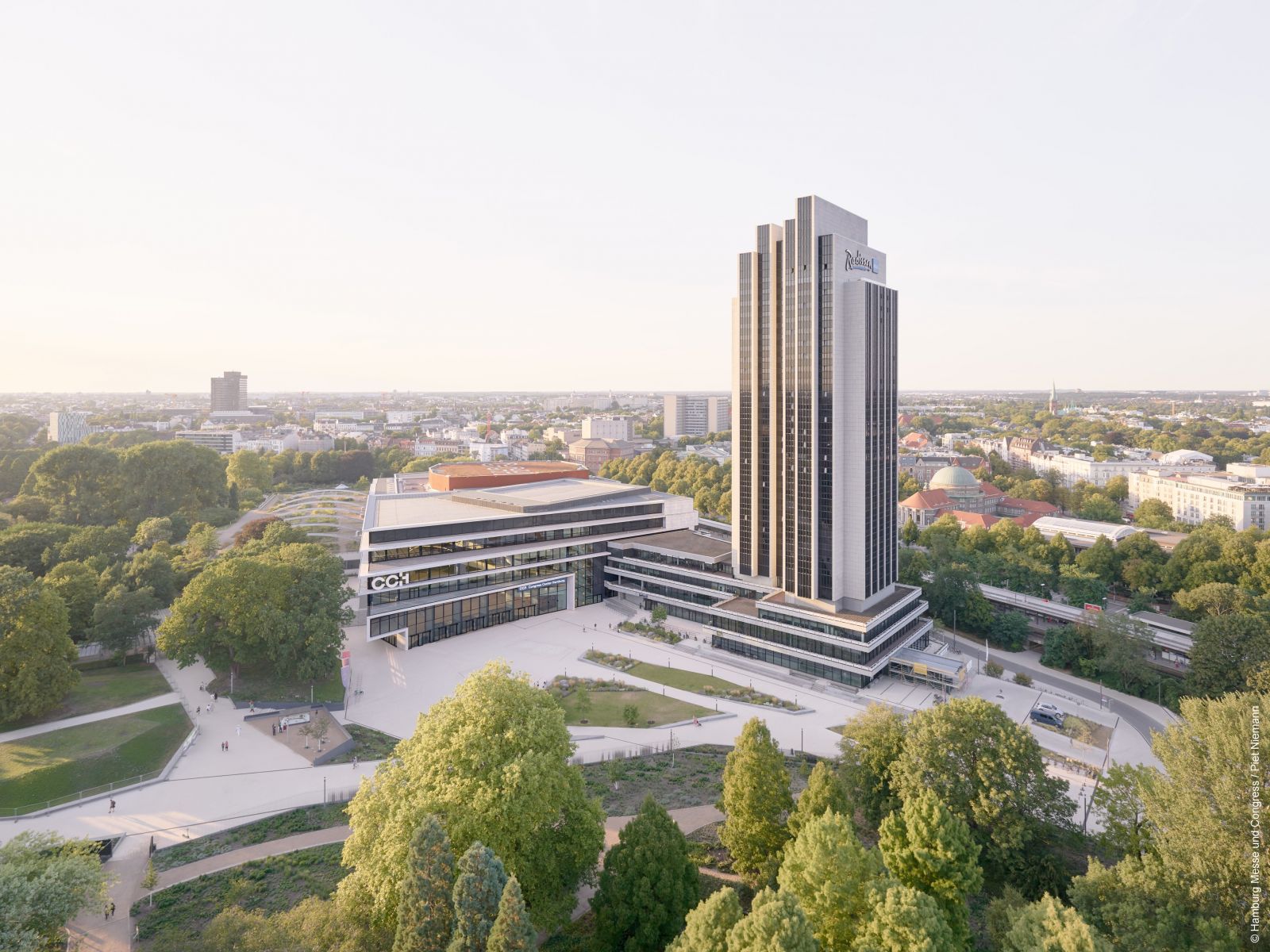CCH – Congress Center Hamburg Sets a New Benchmark for Sustainable Venues

Germany has long been a leader in sustainable development in Europe, setting new standards in many areas, including architecture and green building. The refurbishment and redesign of the CCH – Congress Center Hamburg is proof of this leadership, having received the prestigious Gold Certification in the Revitalisation category from the German Sustainable Building Council (DGNB). Gold is the highest level of DGNB certification for an existing convention centre and underlines not only Germany’s and Hamburg’s commitment to sustainability and innovation, but also the CCH’s important role in setting new standards for venues and the meetings industry.
Originally built in 1973, CCH embarked on a transformational journey, undergoing a major upgrade and redesign. When it reopened its doors in April 2022, the venue unveiled a revitalised look with considerable sustainable improvements. The ambitious refurbishment was masterfully executed through the collaboration of agn Leusmann and Tim Hupe Architects, earning the CCH a Gold Certification. Sustainability was central to the CCH revitalisation from the very start.
Compared to constructing a completely new building, the CO2 emissions from the production processes for the modernisation and redesign of the new CCH – Congress Center Hamburg were reduced by approximately 50%. This amounted to about 25,000 tons of CO2 saved in production. This achievement was crucial in achieving DGNB Gold certification with an overall compliance score of 76.7%.
Andreas Rieckhof, State Secretary at the Ministry of Economy and Innovation in Hamburg, said: “The CCH is one of Europe’s most modern convention centres. It is a key factor for the city’s economic appeal and positive image, and a centre of international scientific dialogue.” This emphasis on sustainability is reflected in every aspect of the CCH, from its architectural design to its operational practices. Additionally, Hamburg Messe und Congress is a signatory of the Net Zero Carbon Events initiative, which advocates for global cooperation within the events industry to jointly address and overcome the challenges of the global climate crisis.
The renovation includes eco-friendly and healthy building products, with 85% of wood products sourced from sustainable forestry. The meticulous selection of building materials was subject to rigorous scrutiny and qualification testing, with the result being outstanding indoor air quality test results. Jan Zak, Auditor in charge of the CCH – Congress Center Hamburg, noted, “For the purposes of DGNB certification, 837 construction products were inspected prior to installation, and tested for suitability regarding material properties and formulation components as a pre-requisite for a healthy interior space hygiene, which has since been confirmed by conducting room measurements.”

Entrance hall of the CCH at the ITS World Congress
High-quality digital lighting and state-of-the-art event technology significantly enhance the user experience at CCH. Through the use of high-efficiency, dazzle-free LED lighting and strategically placed sun breakers for natural shading, the centre maximises energy efficiency and eliminates the need for energy-intensive air conditioning. Architect Tim Hupe highlighted the positive impact of this feature on the delegates’ experience, stating, “The horizontal ‘brise soleil’ sun breakers create a pleasant daylight mood and an excellent visitor experience in the new entrance hall and the Belvedere, which combines well with the fantastic view across the surrounding park landscape. The long horizontal brise soleil elements not only allude to the vertical ornamental strips but also protect against direct sunlight, producing a natural shading effect. Thanks to the smart control of the facade openings, it was possible to avoid installing an energy-intensive air conditioning system.”
Sustainable operations were also emphasised through digital alternatives to printed materials, limiting single-use items and promoting reusable or compostable utensils. 2,000 square metres of additional rooftop garden area have been created to improve the local microclimate and increase biodiversity. This green space adds to the extensive 45-hectare Planten un Blomen (Plants and Flowers) park that surrounds the CCH, offering delegates attending events at the venue a green refuge during their meetings, as well as a perfect view from the congress centre. The renovation of the CCH went beyond the building itself, transforming the surrounding area to make it more accessible and welcoming.
The upgrading of the squares Dag-Hammarskjöld-Platz and Congressplatz means that there is now easy, barrier-free access to Dammtor station. This square has been landscaped with green areas and a fountain, making it a more inviting place for residents and visitors. The area has a special traffic concept optimised for cyclists, with numerous cycle racks, and can accommodate buses and VIP transfer vehicles during events. The Marseiller Street has been narrowed to create the Marseiller Promenade, adding two extra hectares of green space. Accessibility was another priority with features such as barrier-free access, audio induction loops, tactile guidance systems, visual warning systems and digital signage. Their goal was to ensure that every visitor and delegate, with or without a disability, would feel welcome and that these inclusive features would enhance their visit.

CCH areal view © Piet Niemann
The modernisation of the CCH – Congress Center Hamburg was possible thanks to Sprinkenhof GmbH, a company integral to the venue’s new Renaissance. “The revitalisation of the building, which originally dated from 1973, entails a transformation. Thanks to its timeless yet modern architecture that puts people at the centre, the CCH is not only designed to satisfy today’s needs but also to cater to the needs of the future. One aspect we particularly cared about was to make the CCH both high-value and sustainable to be ready for future challenges, and we are excited to see our efforts resulting in Gold certification by the DGNB,” explained Martin Görge, CEO of Sprinkenhof.
Johannes Kreißig, Chief Executive Officer of DGNB, praised the project’s holistic approach: “The forward-looking way in which the legacy substance of the building was handled is of enormous importance in terms of sustainability and climate protection.” Heike Mahmoud, Chief Operating Officer of the CCH, added, “The CCH uniquely combines the concept of ecological, technical, and social sustainability with daring artistic vision. The City of Hamburg’s farsighted planning regarding the sustainability of the CCH has become a key element of our customer acquisition strategy.”
The CCH’s commitment to sustainability sets a new standard in the meetings industry and highlights the global importance of sustainable practices in reducing carbon emissions. This pioneering project demonstrates how existing structures can be revitalised to meet future sustainability goals, paving the way for more innovative and environmentally friendly convention centres worldwide. The CCH success story is a shining example of how sustainability can be seamlessly integrated into modern architecture, providing a model for other convention centres to follow and inspiring a global movement towards sustainable development in the meetings industry and also beyond our scope.
The DGNB at a Glance
The German Sustainable Building Council is Europe’s largest network for sustainable building. Founded in 2007, it offers a certification system that evaluates buildings on a wide range of criteria, including ecological, economic, and socio-cultural quality. The DGNB certification system is a global benchmark, ensuring buildings meet high standards of sustainability throughout their lifecycle.






